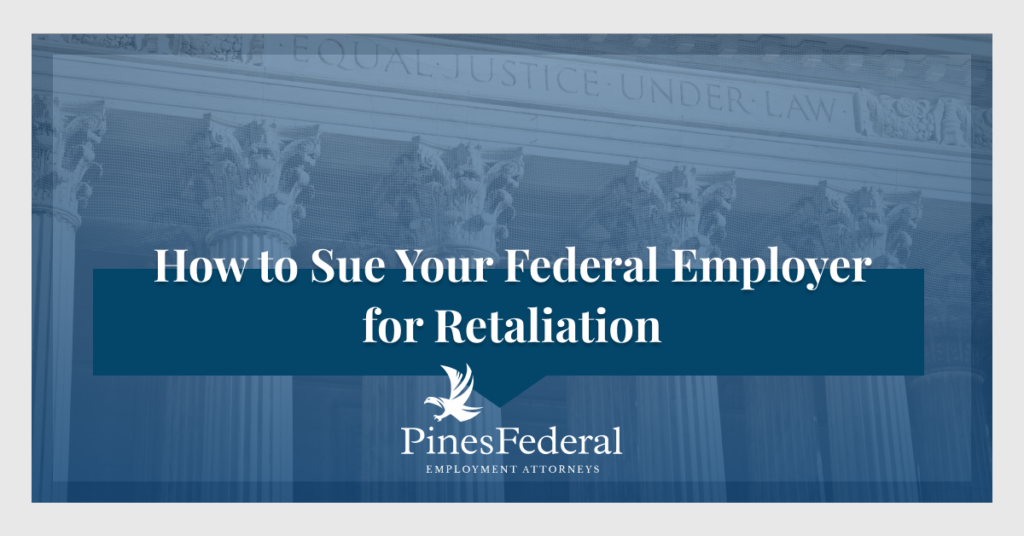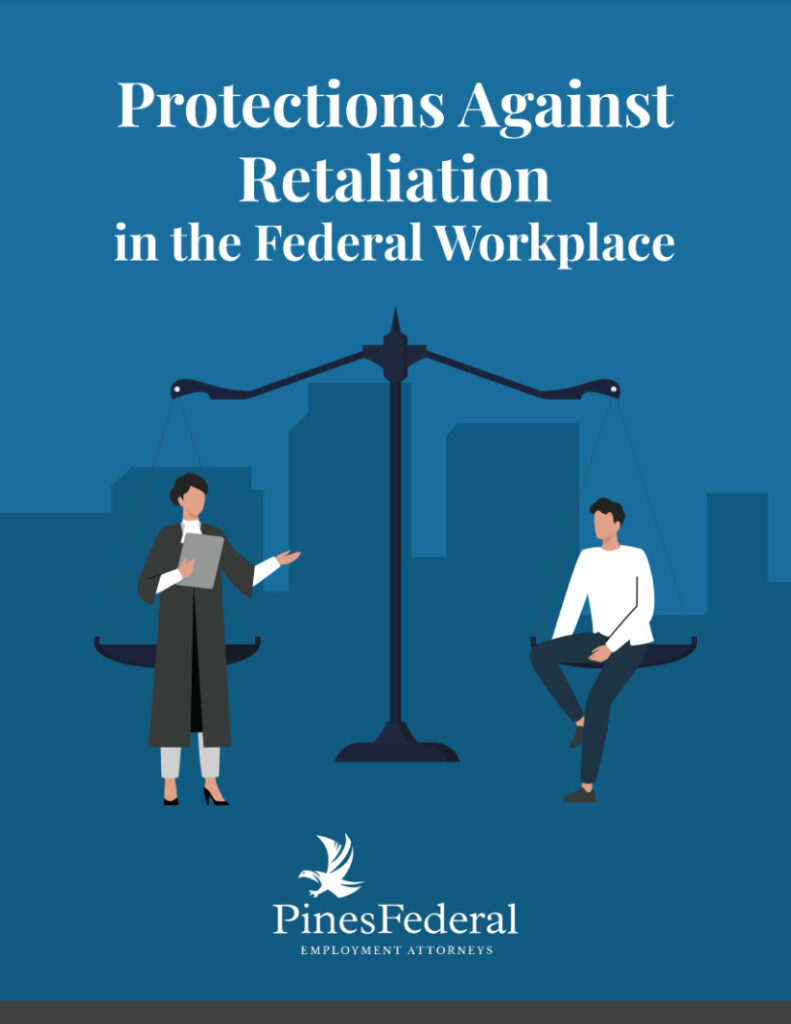
Unfortunately, retaliation is becoming a growing problem in the federal workplace.
Statistics by the U.S. Equal Employment Opportunity Commission (EEOC) reveal that EEO retaliation claims ballooned from only 18,000 claims to almost 38,000 claims in 2023.
As a result, more and more people wonder how to sue their federal employer for retaliation. They’re also curious about what they can get in a retaliation lawsuit and how to prove their retaliation claim.
If you’re one of these people, you have come to the right place. Read on to learn about how to sue your federal employer for retaliation. We’ll also discuss the law’s approach toward proving retaliation and how much you can recover if you prevail.
Ready to learn about your legal options?
Contact one of our dedicated federal employment retaliation attorneys by filling out our online form or calling (800) 801-0598 today.


“I have never been involved in a court case before and was scared to make even the first phone call to seek legal counsel. I found Pines Federal after reviewing several offices…My case was settled to my satisfaction and I can’t recommend this practice enough…”
Can I Sue My Federal Employer for Retaliation?
Absolutely. Laws like Title VII of the Civil Rights Act protect employees by prohibiting retaliation for certain activities, such as requesting reasonable accommodation or reporting illegal harassment. These laws also let federal workers vindicate their rights by filing a complaint in federal court or with the EEOC.
The definition of retaliation is simple. It encompasses any unfavorable treatment of an employee because that employee:
- Requested reasonable accommodation because of a disability,
- Reported illegal discrimination or harassment,
- Requested religious accommodation,
- Refused sexual advances,
- Refused to follow an order that would cause discrimination,
- Participated in a discrimination lawsuit or investigation, or
- Condemned or called out the discrimination of others.
Even simply threatening to report harassment or discrimination counts as protected activity.
Unfavorable treatment extends to virtually every aspect of your work. It includes things like formal discipline, suspensions, social exclusion, transfers, demotions, and micromanaging.
What Makes a Strong Retaliation Case?
A strong retaliation case effectively intertwines the legal elements of retaliation with a pragmatic understanding of workplace dynamics. The heart of a strong retaliation case is clear, empirical evidence, logical consistency, the contexts influencing the retaliation, and its impact. Let’s unpack this in more detail.
- Establishing a protected activity. The start of a strong retaliation case lies in establishing a protected activity, whether it be filing a discrimination complaint, participating in an investigation, or one of the other examples we mentioned above. Whatever it is, your case hinges on demonstrating that this activity falls within the law’s ambit of protection.
- Evidence of adverse action. The next critical element is proving that your employer took an adverse action against you. Ideally, you can show this action was tangible and significant enough to dissuade a reasonable person from engaging in protected activity.
- Causality. Now, you must show a connection between your protected activity and the adverse action. Close timing between the two events is valuable in establishing this connection.
- Statements and testimonies. Verbal or written statements from supervisors, colleagues, or other witnesses that suggest a retaliatory motive can be powerful. This includes remarks that show bias, resentment, or an intent to retaliate against the employee for their actions.
- Pattern of behavior. Evidence showing a pattern of adverse treatment toward employees engaged in protected activities can further strengthen a case. This could be a history of your manager making negative comments about people who filed complaints, like calling them “tattle-tales” or “Johnny do-gooders.”
- Inconsistencies in your employer’s explanation. Employers will oftentimes present a seemingly legitimate reason for their actions. But if your employer’s reason for the adverse action changes over time or is inconsistent with their policies or past practices, it can indicate that their stated reason is a pretext for retaliation.
- Comparative evidence. Showing employees who did not engage in protected activities were treated more favorably under similar circumstances can also be persuasive. This comparison can highlight discriminatory or retaliatory motives.
The final part of a strong retaliation case is clear evidence of the losses you suffered because of the retaliation. This can include financial, professional, and emotional harm.
How Much Can You Sue for Retaliation in the Federal Workplace?

Federal law limits how much you can recover in an action under Title VII.
The cap depends on the size of your employer. For most federal employers, the limit is $300,000.
However, this cap does not include back pay or interest on back pay, so you can recover more than $300,000.
That said, the amount you can recover for retaliation in the workplace varies on several factors. The primary determining factor is the extent of your damages.
The primary types of damages in retaliation cases are:
- Lost wages and benefits. This includes compensation for any lost salary, bonuses, and benefits resulting from the retaliatory action, such as wrongful termination or demotion. You can assess your lost wages by calculating what you would have earned had the retaliation not occurred.
- Emotional distress. You can claim damages for emotional distress that you suffered because of the retaliation. However, it’s a trickier type of damage to prove because it is more subjective and can vary widely between individuals.
- Punitive damages. You can receive punitive damages if you can demonstrate that your employer’s conduct is especially malicious or reckless. The availability and amount of punitive damages will depend in part on the kind of claim you assert.
- Attorney’s fees and legal costs. Most anti-discrimination laws allow the prevailing party to recover reasonable attorney’s fees and legal costs. These fees can easily enter the six-figure range in complex cases.
It’s best to contact a qualified federal employment attorney to learn more. They can assess your case and help you estimate the potential value of your damages.
Let Pines Federal Be Your Ally
Retaliation can turn your life upside down and leave you questioning your sanity. It’s also common to feel powerless. That said, it’s critical you act to defend your rights. Fighting retaliation is always better than tolerating it or simply quitting.
Partner with Pines Federal today to help vindicate your rights and sue your federal employer for retaliation. For decades, we’ve dedicated ourselves to serving the nation’s public servants. We combine decades of relevant experience, a zeal for justice, and a knack for excellent client service to give you the sterling representation you need.
Thanks to our efforts, countless clients have received compensation for missed work, unlawful firings, and emotional distress. You can become a success story too. To get started, reach out to us online or call us at (800) 801-0598 to set up a consultation today.
[DOWNLOAD] Protections Against Retaliation in the Federal Workplace
